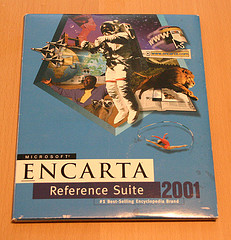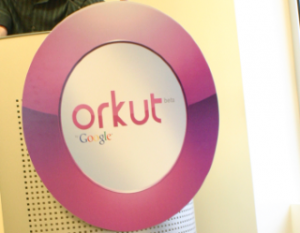 Microsoft announced this week that it is shutting down its MSN Encarta websites around the world (except Japan). Why? Wikipedia.
Microsoft announced this week that it is shutting down its MSN Encarta websites around the world (except Japan). Why? Wikipedia.
Remember not so long ago when MSN Encarta was so often bundled in with other software and hardware purchases (think tax software in the U.S.)? There was a time when getting MSN Encarta for free was a big perk. Today, not so much.
According to a report by HitWise, MSN Encarta websites get less than 2% of all online encyclopedia searches while Wikipedia gets 97% (Encyclopedia.com gets the rest). Not even Microsoft can compete with Wikipedia.
It’s interesting to me that Wikipedia, which is so often criticized for inaccuracies, bias, and so on, can be so dominant. Even Google has tried to compete with Google Knol, but alas, Wikipedia remains strong. Can you think of another brand that retains so much power despite its highly publicized faults? One could argue that U.S. auto manufacturers would be an example, but recent events in that industry show sub-par performance will only get your brand so far.
So the question is this — will a competitor to Wikipedia arise that provides completely accurate information for free? The only differentiator that might make a difference in the online encyclopedia market at this point would be accuracy (and search engine optimization – which Wikipedia dominates). However, even Encyclopedia Britannica has offered free subscriptions to its website, but that brand has brought little competition to Wikipedia. Can another brand beat Wikipedia?
I have to imagine that a time will come when consumers will demand more from Wikipedia, just as consumers are finally demanding more from auto manufacturers. “Good enough” won’t be acceptable forever. Or will it?
Is your brand just “good enough”? If so, make it better – exceed customer expectations, don’t just meet them.
Are there aspects of your competitors’ brands that are just “good enough”? If so, attack them head on and differentiate your brand. Those consumers might not realize yet that they’re settling for “good enough”.
Image: Flickr
Susan Gunelius is the author of 10 marketing, social media, branding, copywriting, and technology books, and she is President & CEO of KeySplash Creative, Inc., a marketing communications company. She also owns Women on Business, an award-wining blog for business women. She is a featured columnist for Entrepreneur.com and Forbes.com, and her marketing-related articles have appeared on websites such as MSNBC.com, BusinessWeek.com, TodayShow.com, and more.
She has over 20 years of experience in the marketing field having spent the first decade of her career directing marketing programs for some of the largest companies in the world, including divisions of AT&T and HSBC. Today, her clients include large and small companies around the world and household brands like Citigroup, Cox Communications, Intuit, and more. Susan is frequently interviewed about marketing and branding by television, radio, print, and online media organizations, and she speaks about these topics at events around the world. You can connect with her on Twitter, Facebook, LinkedIn, or Google+.

Product Managers often fall into the trap of making it “good enough” although deep down we it’s not enough. I’m trying to figure out a way to keep reminding me of this especially when bogged I’m down with the grind.
I think one of the attractions to Wikipedia may also come from the “author” side in that regular people are given the opportunity to exercise their “expertise” and contribute to the content. I can see this appealing to human vanity. Also, you’ve often posted about affording people the opportunity to experience/interact with a brand and Wikipedia does offer this.